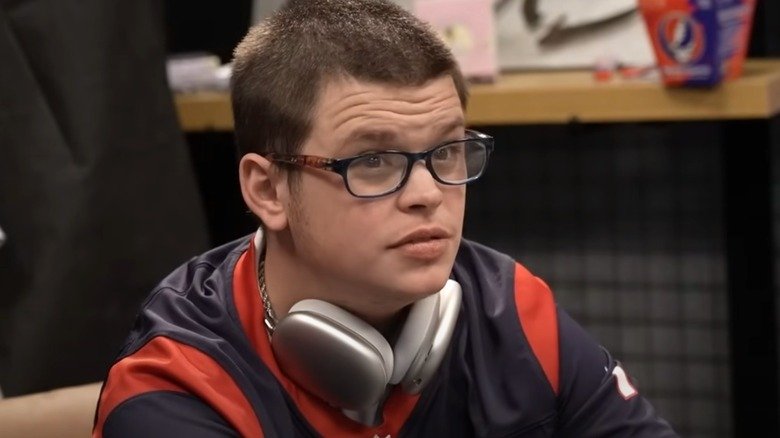Does Sketch Have Tourettes? Exploring the Connection
Tourette Syndrome (TS) is a neurological disorder that causes individuals to have involuntary tics. These tics can be motor or vocal, and the symptoms often begin in childhood. It’s a condition that many people misunderstand due to its portrayal in the media. One person who has usually sparked curiosity surrounding the possibility of having Tourettes is Sketch, a popular figure in the entertainment industry. So, does Sketch have Tourettes? Let’s dive into this question by exploring what Tourette Syndrome is, how it affects people, and whether or not Sketch might have it.
What is Tourette Syndrome?
Before jumping to whether Sketch has Tourettes, it’s crucial to understand what Tourette Syndrome is. Tourette’s condition leads to repetitive, involuntary movements or sounds. These tics typically start in childhood, between the ages of 5 and 10, and can range from mild to severe. While it’s not fully understood why TS occurs, scientists believe it results from abnormal activity in certain parts of the brain that control movement.
Key Features of Tourette Syndrome:
- Motor Tics: Involuntary movements like blinking, head jerking, or shoulder shrugging.
- Vocal Tics: Involuntary sounds or words, such as grunting, throat clearing, or even shouting inappropriate words.
- Onset: Symptoms usually start in childhood.
- Variation: Tics can change in type or intensity over time.
Understanding these core aspects of Tourette Syndrome is essential to determine whether Sketch has Tourettes.
Sketch: Who is He?
Sketch is a prominent figure in the entertainment world, known for his creative works and engaging personality. Over time, his followers and fans have noticed certain quirks in his behavior that might make some wonder if he has Tourettes. Let’s take a closer look at his public persona and his interactions.
A Brief Overview of Sketch’s Career
- Role in Entertainment: Sketch is primarily known for his television and social media contributions.
- Personality: He is energetic, often playful, and sometimes displays unusual speech patterns or physical gestures.
- Public Persona: Fans admire Sketch for his authenticity, but some have noticed what they interpret as “tics” during his performances.
But does this mean that Sketch has Tourettes? Let’s explore further.
The Symptoms of Tourette Syndrome
To better understand if Sketch has Tourettes, it’s essential to compare the behaviors often seen in individuals with Tourette Syndrome to what Sketch exhibits publicly. Although every case of TS is unique, there are common symptoms that can help us make a clearer judgment.
Common Motor Tics
- Blinking: Rapid eye movements or excessive blinking.
- Head Movements: Jerking or nodding involuntarily.
- Facial Grimacing: Making facial expressions without intending to.
- Arm Movements: Uncontrolled gestures like flailing or clenching.
Common Vocal Tics
- Grunting or Sniffing: Making odd sounds repeatedly.
- Echolalia: Repeating words or phrases that others say.
- Coprolalia: In rare cases, involuntary swearing or inappropriate comments.
- Throat Clearing: Clearing one’s throat excessively.
Possible Link to Sketch
Based on his public appearances, it doesn’t seem like Sketch consistently exhibits these symptoms enough to conclude that Sketch has Tourettes. However, some behaviors might mimic those tics unrelated to the syndrome. Understanding the full spectrum of TS can help distinguish between these possible causes.
Could Sketch’s Behavior Be Linked to Other Conditions?
While some of Sketch’s movements or sounds may appear similar to tics, it’s important to ask whether they could be linked to other conditions or part of his unique style. Different factors may influence his behavior.
ADHD and Other Neurological Conditions
- Attention Deficit Hyperactivity Disorder (ADHD): Symptoms of ADHD, such as impulsivity and hyperactivity, may lead to behaviors that seem similar to tics.
- Anxiety: Sometimes, stress and anxiety can cause twitching or nervous habits that could be mistaken for tics.
- Habitual Actions: Certain habits or mannerisms can become so ingrained that they appear to be tics, even though they’re not involuntary.
This is important because it suggests that Sketch’s behaviors could be a result of factors other than Tourette Syndrome, such as personal habits or other psychological influences.
Is Sketch’s Behavior Just Part of His Unique Style?
Sketch is known for his outgoing and sometimes eccentric persona. Many public figures develop distinctive mannerisms or performance styles that are intentional rather than involuntary. Could it be that Sketch’s behavior is just part of his public identity?
The Role of Performance in Public Life
- Exaggeration for Effect: Many performers exaggerate their actions to engage audiences or stand out.
- Signature Behaviors: Some public figures develop specific quirks or catchphrases that make them memorable.
- Self-Expression: Creative individuals often push boundaries, including physical movements or speech patterns.
For Sketch, the behaviors people notice are part of his performance rather than signs of a neurological condition. In entertainment, these quirks can become essential to a performer’s identity.
Could Sketch Have Tourette Syndrome?
So, does Sketch have Tourettes? The answer is not clear-cut. From what we can observe in public, there isn’t enough evidence to definitively say that Sketch has Tourette Syndrome. While some of his movements might seem odd or repetitive, they could be attributed to personal habits, the demands of his career, or even other neurological conditions like ADHD.
Signs that Sketch Might Not Have Tourettes
- Lack of Consistent Tics: TS is usually involuntary and frequent, whereas Sketch’s behavior seems more occasional or performance-driven.
- Absence of Vocal Tics: Most individuals with Tourette Syndrome also have vocal tics; there’s; there’s no strong indication that Sketch regularly exhibits these regularly exhibits these.
- No Diagnosis: There’s no public indication that Sketch has been diagnosed with Tourette Syndrome, and without an official diagnosis, it’s difficult to make any assumptions.
Ultimately, it’s important to remember that only a medical professional can diagnose Tourette Syndrome, and it’s not fair or accurate to label someone based on public perception alone.
What Can We Learn from Sketch’s Experience?
Whether or not Sketch has Tourettes, his public persona offers valuable insights into how people perceive others and the impact of stereotypes surrounding neurological conditions.
Raising Awareness About Tourettes
- Breaking Stereotypes: By understanding the nuances of conditions like Tourette Syndrome, we can stop the spread of misconceptions and support those with the condition.
- Normalizing Uniqueness: Sketch’s behavior may be unconventional, but that doesn’t make it any less valid or valuable. It’s important to embrace differences related to neurological conditions or personal quirks.
- Empathy and Understanding: Instead of jumping to conclusions about someone’s behavior, it’s crucial to consider the broader context of their life and experiences.
Conclusion: Does Sketch Have Tourettes?
So, does Sketch have Tourettes? Based on available evidence, it doesn’t seem that he does. While his behavior might sometimes resemble tics, no concrete proof or diagnosis suggests that Sketch has Tourettes. Instead, it seems more likely that his actions are a part of his performance style or other factors.
Regardless of the answer, it’s important to remember that everyone is unique. Whether someone has a neurological condition like Tourette Syndrome or has distinctive traits, it’s essential to approach them with empathy and understanding. By raising awareness and breaking down stereotypes, we can create a more inclusive and accepting world for people of all backgrounds and experiences.








Post Comment